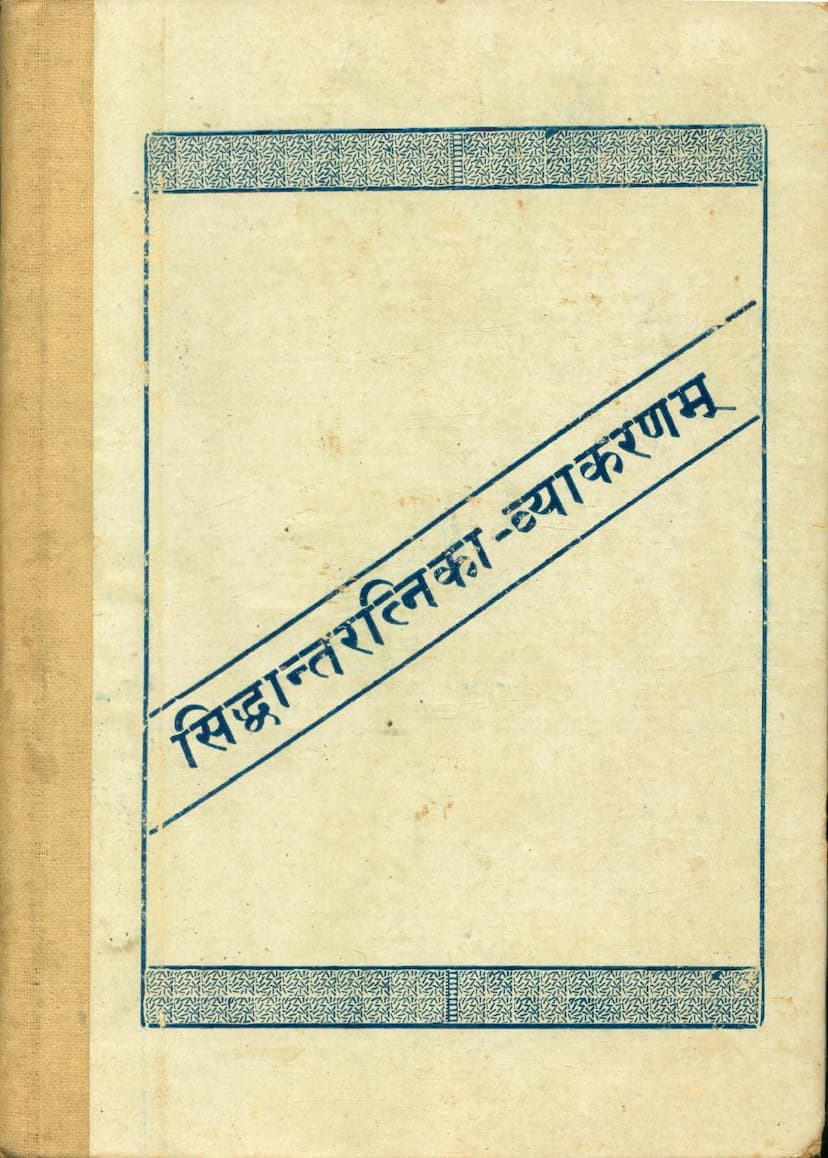Siddhantratnikakhyam Vyakaranam
Added to library: September 2, 2025

Summary
Here's a comprehensive summary of the provided Jain text, "Siddhantratnikakhyam Vyakaranam," based on the pages you've shared:
Book Title: Siddhantratnikakhyam Vyakaranam (सिद्धान्तरत्निका-व्याकरणम्) Authors: Jayantvijay (जयन्तविजय), Vidyavijay (विद्याविजय) Publisher: Yashovijay Jain Granthmala (श्रीयशविजय-जैन-ग्रन्थमाला) Publication Year: Vira Samvat 2456 (Veer Samvat 2456) / Vikram Samvat 1986 (V.S. 1986) / AD 1929
Overview:
"Siddhantratnikakhyam Vyakaranam" is a grammatical treatise of Jainism, likely focusing on Sanskrit grammar within the Jain tradition. The provided pages offer extensive details about its publication, content, and the significance of grammar in Jain philosophy.
Key Information and Content Highlights:
-
Title and Authorship: The book is explicitly named "Siddhantratnikakhyam Vyakaranam." The title page and other introductory pages credit Muni Jayantvijay for the "Uttarardha Vritti" (उत्तरार्धवृत्ति) and Muni Vidyavijay for its revision and commentary ("Siddhanta Muktanama Katikappana Pahit") and the revision of the entire work. It mentions that the original work was authored by Sri Jinachandrasuri (श्रीजिनचन्द्रसूरि). The work is also referred to as "Siddhantratnika" (सिद्धान्तरत्निका).
-
Editorial and Publishing Details:
- The work is based on two manuscripts: one written in V.S. 1965 (1908 AD) from the collection of Maharani Shri Kantivijay of Vadodara, and another written in V.S. 1899 (1842 AD) from the Vijaydharmalaxmi Gyanmandir of Agara.
- The publication was facilitated by Yashovijay Jain Granthmala in Bhavnagar.
- It is a second edition, published in V.S. 1986 (1929 AD), with 1000 copies printed.
- The preface (Aamukham - आमुखम्) emphasizes the fundamental importance of grammar for understanding all scriptures and achieving spiritual liberation.
-
Importance of Grammar in Jainism:
- The "Aamukham" (Preface) strongly asserts that grammatical knowledge (Vyakaran-gyan) is the first thing that should be acquired by all humans.
- Grammar is described as the "door to all sciences" (sarvashastranam dwaram) and the "root of all knowledge" (moolam asheshavidyanam).
- It highlights that the Tirthankaras themselves, through their perfect knowledge, propounded grammar and other arts for the welfare of the world.
- The text traces the origin of grammatical knowledge back to the Tirthankaras, mentioning that Lord Mahavir dictated the entire science of words to Indra, hence its name "Aindra Vyakarana."
-
The Author of the Original Grammar (Siddhantratnika):
- The preface details the lineage and identifies the original author as Sri Jinachandra Gani (श्रीजिनचन्द्रगणि).
- He was a disciple of Mahopadhyay Sagarachandra, who was himself a disciple of Sri Jinachandrasuri (likely meaning the original Jinachandrasuri who wrote the grammar).
- Sri Jinachandra Gani is credited with composing "Siddhantratnika" (सिद्धान्तरत्निक), which consists of concise sutras and a vritti (commentary).
- The work's sutras are noted to be largely similar to those in the "Sarasvatachandrika Vyakarana."
-
Content of the Grammar: The provided pages show that the book covers a comprehensive range of Sanskrit grammatical topics, including:
- Sanja Prakaranam (संज्ञाप्रकरणम्): Nouns and their classifications.
- Paribhasha (परिभाषा): Grammatical rules and principles.
- Sandhi Prakriya (सन्धिप्रक्रिया): Rules of phonetic joining (vowel sandhi, consonant sandhi, anusvara sandhi, visarga sandhi).
- Shadling Prakaranam (षड् लिङ्गप्रकरणम्): Declension of nouns in six categories (Masculine, Feminine, Neuter, etc., based on endings like vowel-ending, consonant-ending). This section is very extensive, covering various declensions and case endings.
- Taddhita Prakaranam (तद्धितप्रकरणम्): Suffixes that are added to roots or nouns to form new words (derivational suffixes).
- Karaka Prakaranam (कारकानि): Grammatical cases and their functions.
- Samasa Prakaranam (समासप्रकरणम्): Rules of Sanskrit compound words (Avyayibhav, Tatpurusha, Dvanda, Dviguh, Bahuvrihi, Karmadharaya).
- Akhiyat Prakriya (आख्यातप्रक्रिया): Verb conjugation, covering various classes of verbs (Bhavadi, Adadi, etc.) and tenses (Lata, Lot, Lang, Lit, Luta, etc.).
- Kridanta Prakaranam (कृदन्तप्रकरणम्): Formation of verb-derived nouns and adjectives using suffixes likekta, ktvatu, shatru, shana, etc.
- Unadi Prakaranam (उणादयः): Special suffixes not covered by general rules.
- Namdhatu Prakriya (नामधातुप्रक्रिया): Formation of verbs from nouns.
- Yaganta Prakriya (यङन्तप्रक्रिया): Verbs formed with the
yaṅaugment. - Yagluganta Prakriya (यङ्लुगन्तप्रक्रिया): Verbs formed with
yaṅluṅ. - Kandvadi Gana (कण्ड्वादयः): A specific class of roots.
-
Commentary and Annotation: The "Uttarardha Vritti" (उत्तरार्धवृत्ति) by Muni Jayantvijay is a key commentary. Muni Vidyavijay provided a simple and useful annotation (Tippaṇa - टिप्पण) on this vritti, likely to make the text more accessible to students. Muni Himanshu Vijay (हिमांशुविजय) wrote the preface (Aamukham - आमुखम्).
-
Dedication and Support: The publication is dedicated to Jagatpujya Shri Vijayadharmasuri (जगत्पूज्यश्री विजयधर्मसूरिभ्यो नमः). The second edition was published with financial support from various generous individuals, whose names are listed, often in remembrance of their parents.
Significance:
The "Siddhantratnikakhyam Vyakaranam" is presented as a valuable tool for learning Sanskrit grammar, particularly for those aiming for proficiency in Jain scriptures and related philosophical texts. The effort to publish a second edition with improved commentary and annotation highlights its importance and continued relevance for Jain scholars and students. The extensive list of sutras indicates a thorough treatment of grammar, making it a foundational text for linguistic study within the tradition.